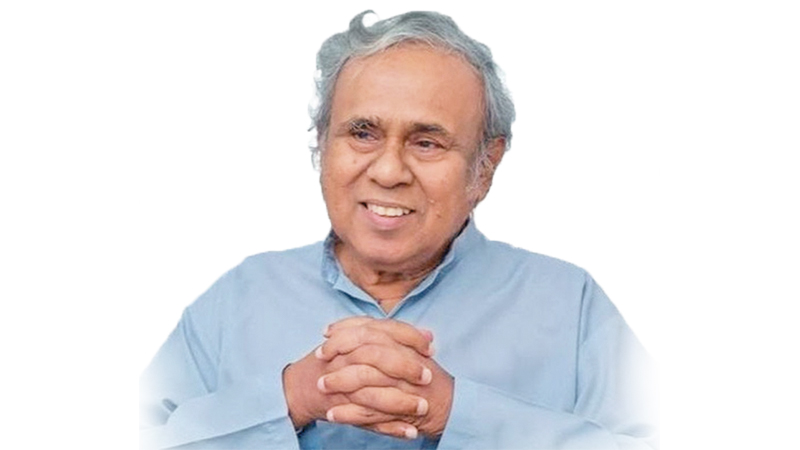“Can we question the existence of a world beyond ourselves? It’s evident that the world preceded the birth of those younger than me and persisted after the passing of those who came before me. If the world doesn’t materialise or vanish solely based on individual births and deaths, then my own experiences are not unique. The world existed before my arrival and will endure beyond my departure,”
That’s how the renowned intellectual Dr. Nalin de Silva began the core text of his philosophical biography, titled ‘My World’.
Nalin de Silva’s journey began in Wedakada, Panadura, where he was born into a family of educators on October 20, 1944. His early education commenced under the guidance of his mother, who was a teacher at the local school. Later, he continued his studies at Thurstan College and at Royal College in Colombo.
As Nalin progressed to higher classes, his keen intellect became increasingly evident. He participated in the debating team at Royal College, alongside peers like Indika Gunawardena and Neelan Thiruchelvam. Remarkably, the same aptitude he displayed in mathematics was also evident in his debating skills, showcasing his versatility. This duality of talents earned him recognition and distinction among his peers.
De Silva, upon entering the University of Peradeniya for his higher education, quickly garnered praise from both faculty and fellow students for his exceptional academic prowess. During the final exams for his degree, he found the allotted time to be excessive, as he completed his papers in just one and a half hours. Despite his academic achievements at Peradeniya, de Silva remained actively involved in Leftist politics even after his time at the university.
At Peradeniya, Wikramabahu Karunaratne and Sumanasiri Liyanage joined forces with Nalin, forming a formidable political alliance. Together, these three individuals gained popularity on the campus, earning them the moniker of the “Leftist Three” gang. This marked a significant shift in Nalin’s narrative.
Theoretical Astrophysics
In 1969, following his graduation with honours, de Silva secured a prestigious Rhodes Scholarship and ventured to Sussex University in Britain for advanced studies. There, he embarked on his doctoral journey in Theoretical Astrophysics, delving into the intricacies of gravitational effects in astrophysics for his thesis.
De Silva frequently grappled with feelings of homesickness, coupled with a propensity for frequent outbursts of anger. This disposition also coloured his decision-making process, where impatience was a common feature. Despite the standard three-year duration for doctoral research, his intense longing to return home prompted him to complete his thesis in a mere year and a half. Displaying characteristic boldness, he presented his finished thesis to the university with the assertive declaration, “Here is my thesis. Make a decision as you wish.”
His Professor, deeply impressed by his student’s exceptional talent, recommended to the Senate of the University that a doctorate should be conferred for de Silva’s thesis. However, as per the regulations of the University of Sussex, a mandatory three years of research is typically required for a Ph.D. Nevertheless, the Senate, recognising de Silva’s exceptional abilities, decided to waive this requirement in his case.
In recognition of the significance of his thesis, Sussex University made an exception to its institutional regulations and conferred a Ph.D. upon Nalin. Upon his return to his homeland, at the age of 26, Nalin received a letter from his mentor, Prof. McRae, who expressed, “Your country will be proud of you.”
While teaching mathematics at the University of Peradeniya, Nalin de Silva actively engaged in Marxist politics and was affiliated with the Sama Samaja Party (LSSP). However, following an amicable discourse among himself, Dr. Wickramabahu Karunaratne, and Dr. Sumanasiri Liyanage, they chose to depart from the party and established a new entity, the New Sama Samaja Party (NSSP).
By this juncture, de Silva found himself grappling with a myriad of philosophical inquiries concerning Marxism. Concurrently, he underwent a philosophical divergence from Marxism.
Transitioning from Peradeniya to Colombo University, his philosophical outlook underwent a significant evolution. His stance on science also underwent a transformation, as he began articulating his thoughts with regard to country and culture.
In the early 1980s, he initiated a new platform to propagate his ideologies. Amid ongoing dialogues with the student body of the Faculty of Science at the University of Colombo, his seminal philosophical work “Mage Lokaya” was published in 1986. He forged a philosophical pathway for Sinhala Buddhist nationalism, pioneering the ideological current known as “creative relativism.”
Philosophical exploration
De Silva paved the way for the philosophical exploration of Sinhalese identity and Buddhism. His life’s work was dedicated to safeguarding the Buddha-Sasana and the Sinhalese community in spite of the heavy criticism against him.
De Silva remained unfazed by criticisms throughout his life.
His passing occurred while he was residing with his sons in the United States. According to the family’s wishes, he will be cremated in the United States today.




